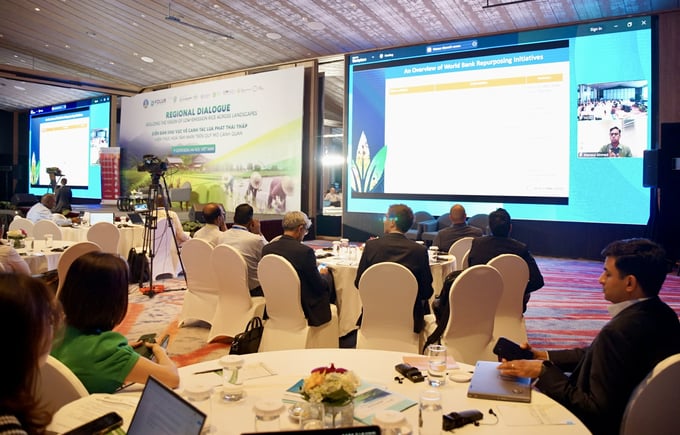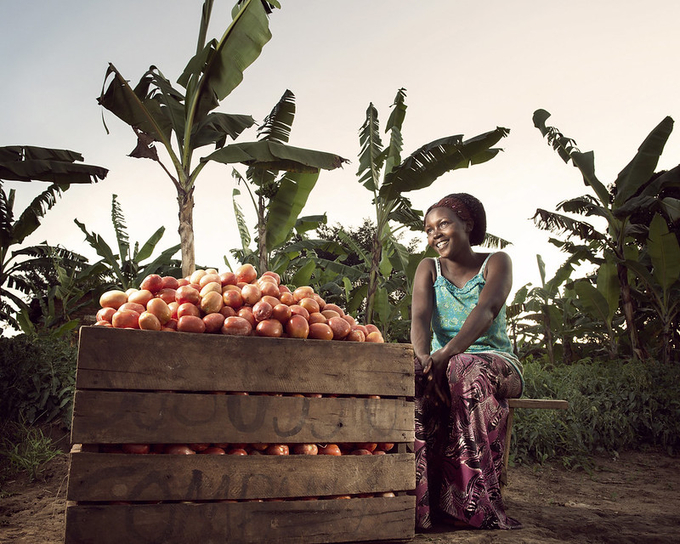May 18, 2025 | 12:55 GMT +7
May 18, 2025 | 12:55 GMT +7
Hotline: 0913.378.918
May 18, 2025 | 12:55 GMT +7
Hotline: 0913.378.918

Mr. Mansur Ahmed presented his insights on "Reorienting incentives and costs for low-emission rice production - Global initiatives" at the regional forum on "Low-emission rice cultivation". Photo: Linh Linh.
Mr. Mansur Ahmed presented his insights on "Reorienting incentives and costs for low-emission rice production - Global initiatives" at the regional forum on "Low-emission rice cultivation" on the morning of September 10th.
According to Mr. Mansur Ahmed, the global food system presently confronted with numerous significant obstacles. The frequency of extreme weather events is on the rise due to climate change, which is having a detrimental impact on agricultural production and yields. Conversely, the global population has increased to more than 8 billion individuals, resulting in a greater demand for sustenance, particularly low-emission agricultural products.
However, the contribution of the agriculture sector to global food production is on the decline. This results in millions of people still suffering from hunger and malnutrition, especially in regions such as Africa and South Asia.
In addition, environmental pollution, climate change, and soil degradation are also threatening food supplies. Despite technological advances in agriculture, their adoption and implementation are still restricted, while health concerns associated with undernutrition and hazardous diets are also on the rise.

The global population has increased to more than 8 billion individuals, resulting in a greater demand for sustenance, particularly low-emission agricultural products. Photo: Stephan Gladieu / World Bank.
Therefore, in order to achieve global GDP growth and sustainable development goals, it is imperative that nations reevaluate the efficacy of their existing policies. They should reorient and systematize incentives and costs for low-emission rice production based on the results of this evaluation. The global objectives that have been established will be achieved by assisting farmers in the transition to sustainable agricultural methods and the adoption of new technologies and techniques.
Mr. Mansur Ahmed emphasized the importance of modeling forecasts and outcomes that are projected to occur by 2040. This involves considering the broader picture of agriculture and other factors such as the environment, additional support measures for farmers, government support models, socio-economic outcomes, poverty reduction, and income enhancement.
"On the other hand, countries need to recognize that reorienting incentives and costs for low-emission rice production can bring significant benefits in terms of product quality and emission reduction. However, it is also important to consider the challenges related to costs and productivity. Specifically, while high-quality products and reduced emissions are achievable, costs may increase, and yields may be lower. Therefore, we encourage the involvement of the private sector and farmers to help avoid additional production and environmental costs", Mr. Mansur Ahmed shared.
The team of experts from the World Bank is also supporting the development of alternative policy options by reviewing support programs for analyzing the impact of production inputs in the agricultural sector, seeking new evidence to reorient policies, and providing global analysis reports. This necessitates the development of pilot models that are unique to various countries.
Additionally, to optimize benefits and minimize challenges, policies need to be designed flexibly and comprehensively. Financial support and technical training measures should be provided to farmers to help them adapt to new technologies and improve production efficiency over time. Policies should also include regular monitoring and evaluation to adjust support programs according to real-world conditions and farmers' needs. This approach can achieve a balance between enhancing product quality, reducing emissions, and maintaining sustainable productivity in the long term.
Currently, pilot activities are being implemented in 7 countries. These pilots will evaluate the models chosen by producers and facilitate the implementation of suitable scientific and technical methodologies and procedures. Furthermore, farmers are actively pursuing agricultural extension programs and investments in agricultural inputs that are in accordance with their financial capabilities.
In terms of policies that provide assistance to small-scale producers, Mr. Mansur Ahmed stated that this is a key objective of the World Bank's program. It is imperative that policymakers in a variety of countries develop state policies that effectively support farmers, thereby guaranteeing that they derive genuine benefits from these support programs.
"We encourage 14 countries to utilize these support policies. Additionally, it is imperative to implement additional instruments, including incentives and pricing mechanisms, to support small-scale producers in cultivation and production. This enables us to comprehend the significance of these policies and guarantees that producers receive both direct and indirect assistance. Consumers can also indirectly contribute by purchasing low-emission products. The government must establish the most favorable conditions for farmers to achieve carbon neutrality in their farming activities", the World Bank expert said.
Regarding overall solutions, Mr. Mansur Ahmed suggested that state subsidies should not be implemented in isolation. A comprehensive view of the entire agriculture sector and food system is necessary to design the most suitable support packages, thereby assisting farmers in practicing agriculture more conveniently and effectively.

(VAN) Fourth most important food crop in peril as Latin America and Caribbean suffer from slow-onset climate disaster.

(VAN) Shifting market dynamics and the noise around new legislation has propelled Trouw Nutrition’s research around early life nutrition in poultry. Today, it continues to be a key area of research.

(VAN) India is concerned about its food security and the livelihoods of its farmers if more US food imports are allowed.

(VAN) FAO's Director-General emphasises the need to work together to transform agrifood systems.

(VAN) Europe is facing its worst outbreak of foot-and-mouth since the start of the century.

(VAN) The central authorities, in early April, released a 10-year plan for rural vitalization.

(VAN) Viterra marked a significant milestone in its carbon measurement program in Argentina, called Ígaris, reaching 1 million soybean hectares measured.